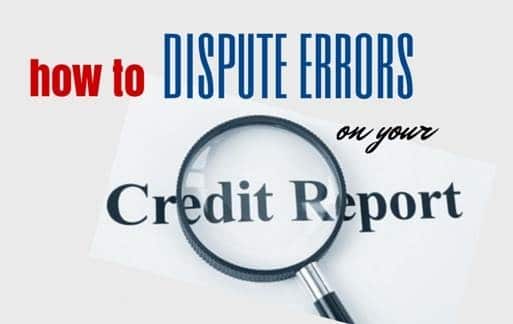Do you want to know how to fix errors on your credit report? To err is human, but what if it affects your credit? Wouldn’t you take all the necessary steps to rectify those errors? The credit report, which states the individual’s credit history may have errors in rare cases. These errors could affect your credit score and hold you back from getting a loan or credit card. This article addresses the types of errors and the possible ways to fix those mistakes.
Sounds scary? It’s a reality. Thousands of Americans nationwide have reported errors on their credit report. It was such a big problem that it’s been talked about on television programs.
But there is a solution if you’re willing to take the problem into your own hands. Not many people know about it, but it does exist, thanks to federal law. There are credit repair programs with services that improve the credit score of individuals. They also guide us in finding the errors and fixing them if it’s possible.
Sources of Errors On Your Credit Report
Before attempting to fix errors, you must find the root cause of the problem. Mistakes may happen for any reason, so it is best to approach solving the issue with patience. The error might occur from any side of the network like customers, lenders, financial sectors, reporting agencies, and credit bureaus, so you must analyze where it went wrong and try to fix it as best you can.
Here are some of the possible errors that may occur in the credit report:
Clerical errors.
Errors at the credit bureaus are likely to originate at the creditor or other company furnishing the information. They’re human, after all, and they need to process many items per day when adding items to your report. Mistakes slip through the cracks, but they could have very real effects. Reporting a debt as unpaid when it was paid, or reporting a payment as lower than the minimum when it was higher… these things happen and could have very real effects.
Mistaken identity.
If you have the same name or a similar name as someone else, items on one person’s file may end up on yours. It’s a type of clerical error, but it’s one of the most common around. Also read: How you can prevent identity theft.
Records are not updated properly on the lender’s end.
Lenders make mistakes, too, and they may forget to update a record in their database that is sent to the credit bureaus. This may result in debts mistakenly going to collections because no one bothered to check,
Or, an on-time payment might be reported as late. Or, collections accounts may be reported as still unpaid after the debt has been paid or settled. And so on, and so on.
Credit fraud.
This technology is an error, as it’s disputable and it didn’t come from you. But fraudulent items caused by identity theft or stolen credit cards might still appear on your credit report. You can, and should, dispute them so they don’t harm your credit score.
Related articles: How to Protect Your Credit from Fraud
Step 1: Check for errors on your credit report
Get your free credit report at https://www.annualcreditreport.com. The site is official, but it is owned and operated by Central Source, LLC, which is sponsored by the Big Three credit bureaus.
The purpose is to follow federal legislation requiring that credit bureaus provide a free copy of your credit report once a year.
Request one from all three credit bureaus, as they collect information differently.
Investigate it thoroughly. Take a look at each item on each credit report.
If you can’t remember ever making a loan with a specific office, it’s time to move on to step 2.
If you don’t believe an item should be on your credit report anymore (it’s older than 7 years old, or the case has been resolved) then move on to step 2.
Step 2: Call up the lenders mentioned in the report
Your credit report will list the balance, the loan, and the lender in question. Most often, this information will be listed on your consumer report.
Lenders can be understanding, and dealing with them directly is the best way to resolve issues on your credit report.
Sometimes, though, they are unable to do anything about an item that is already on the report, especially if the debt has already been settled. At that point, for more info on How To Fix Errors On Your Credit Report, move on to step 3.
Step 3: Call up the credit bureaus
If the lenders are of no help, it’s time to call the credit bureaus and let them know directly.
Come prepared and understand the following:
Ask them, point-blank, about every single item of concern on your credit report. If you are confident that the information listed by the creditor on the report is in any way inaccurate, tell them and they will be able to open a dispute.
A dispute happens when an item on your credit report is thought to be in question. Employees of the credit bureau will look into it and determine whether or not they deem it legitimate.
You Need To Know: Credit Bureaus’ Settlement with 31 States
Step 4: Still no help? Did the dispute fail? Get outside help on How To Fix Errors On Your Credit Report
Credit bureaus may not have enough information to accurately settle a dispute, or even open up a dispute. You may have trouble getting through the dispute process. You may not have the time or patience it may require. You may simply not want the headache of dealing with creditors and the credit bureaus.
However, there is help for you if you need it. You need an advocate.
The Credit Pros is a team of credit experts founded by a lawyer well-versed in the ways of the credit bureaus.
The biggest benefit that The Credit Pros and other similar companies provide is the peace of mind knowing your problem will be taken care of by knowledgeable people. You could spend hours on the phone and weeks waiting for responses, causing you stress and worry… or you can let the professionals take care of it for you!
Frequently Asked Questions
How do I dispute an error on my credit report?
To dispute an error on your credit report, contact both the credit reporting company and the company that provided the information.
What happens if there’s negative information in my credit report?
Credit bureaus sell the information in your report to businesses that use it to decide whether to loan you money, give you credit, offer you insurance or rent or sell you a home.
Some employers use credit reports to decide whether to hire you. The strength of your credit history also affects how much you’ll have to pay to borrow money. If there’s a lot of negative information in your report, you might have to pay more in interest.
What is the most common error that can occur in credit reports?
As mentioned on Forbes.com, there are identity errors like misspelling your name, a change in security number, and mistakenly reporting the other person’s record are among the most common mistakes. These may occur due to human error or technical issues in the system. *1
Will the credit bureaus rectify the errors?
If you find an error, submitting proper proof and documents will increase your chances of having it updated or deleted to correct status. Once they confirm the documents match the data in the report, then the bureaus will take the necessary steps in resolving the dispute.
Where will I find my credit report?
Customers can view their credit report every 12 months through www.AnnualCreditReport.com/. This official site provides users with the reports of all three credit bureaus. Need help understanding the pros and cons of credit repair? Read our article here: Professional Credit Repair vs DIY
Conclusion
Credit reports can assist lenders in making decisions on loan approval. Keeping this report authentic and error-free is necessary to prove your creditworthiness. A simple error in reports can impact the individual’s credibility, so monitoring credit reports is not only important to increase your performance, but also helps you fix any errors. If there is an error, you must find the cause of the error and approach the credit score agencies or credit bureaus to resolve your issues. Maintaining the right data will help you achieve your loan requirements.
You may reach out to our experts to get further assistance on this matter.
Check Your Credit Score — Your Credit Report May Have These Errors (forbes.com)


